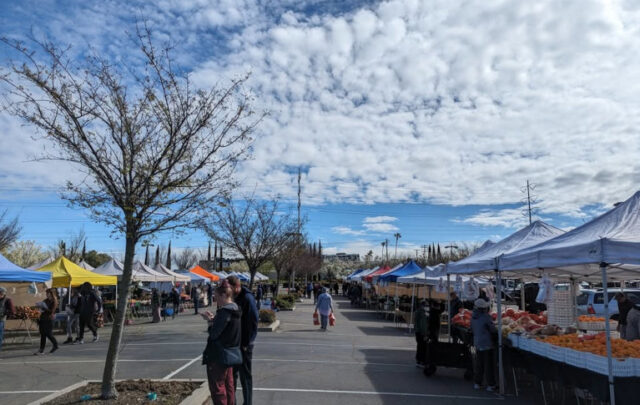 I want to add a few thoughts on the significance of Michael Pollan’s recent essay in The New York Review of Books to Bonnie Powell’s summary.
I want to add a few thoughts on the significance of Michael Pollan’s recent essay in The New York Review of Books to Bonnie Powell’s summary.
Pollan posits the existence of a social movement geared to transforming the food system. He emphasizes that it’s loose, internally conflicted, and nascent — but all the same, “one of the most interesting social movements to emerge in the last few years.” People have been talking about the “food movement” for a while, but I don’t think anyone has articulated its existence so clearly and in such an important publication.
The timing, for me, is interesting. The U.S. glaringly lacks a broad progressive social movement. Today, we’re mired in two drawn-out wars, we’re in a protracted economic slump, and we’re seeing the fruits of 30 years of deregulation and crony capitalism flourish in the Gulf. Yet our most visible and powerful social movement involves a bunch of “Tea Party” reactionaries attacking “big government.”
“Where is the left?,” David Roberts recently asked on Grist:
There is a healthy elite class of politicians, journalists, and thinkers, but where’s the progressive movement? From what I can tell, there just isn’t one. There’s a decent labor lobby, a decent immigration lobby, but nothing larger than the sum of its parts.
Could the budding food movement fill that void? Food might seem like a narrow issue, but its tentacles range widely through society. Our food system is both a cause and a symptom of some of our deepest dysfunctions — and reforming it means addressing them, too. Pollan points to a couple of gaping examples: the healthcare mess and the failure to confront climate change.
“The health care crisis probably cannot be addressed without addressing the catastrophe of the American diet,” he writes, “and that diet is the direct (even if unintended) result of the way that our agriculture and food industries have been organized.” As for climate, “It will be difficult if not impossible to address the issue of climate change without reforming the food system,” he argues.
He hits upon a third food-related dysfunction, one I’ve never seem him address before and have, in fact, been hectoring him about for a while: wage stagnation. Pollan writes:
Besides drawing women into the work force, falling wages made fast food both cheap to produce and a welcome, if not indispensible, option for pinched and harried families. The picture of the food economy [Fast Food Nation author Eric] Schlosser painted resembles an upside-down version of the social compact sometimes referred to as “Fordism”: instead of paying workers well enough to allow them to buy things like cars, as Henry Ford proposed to do, companies like Wal-Mart and McDonald’s pay their workers so poorly that they can afford only the cheap, low-quality food these companies sell, creating a kind of nonvirtuous circle driving down both wages and the quality of food. The advent of fast food (and cheap food in general) has, in effect, subsidized the decline of family incomes in America.
Pollan makes that point early in the essay, and doesn’t return to it. But to me, that paragraph is a lucid articulation of the biggest obstacle facing the food movement — and also its greatest opportunity for broad relevance. Wage stagnation is an obstacle, because if tens of millions of people can’t afford to pay the “real cost of food,” then the food movement will be doomed to permanent niche status. The alternative food networks it creates will serve as a shiny gloss on a dominant food system lurching ever downward toward disaster.
But structural wage stagnation is also an opportunity. Wages have tumbled because of the the corporate-led globalization of manufacturing; and the corporate-led globalization of food is just a subset of that broader trend. Yet even in the poorest neighborhoods, people spend $1,000 per capita on food. In the current system, the great bulk of that cash flows out of communities and into the bottom lines of big companies like Walmart and McDonald’s, leaving behind only low-wage, unskilled jobs, and health-ruining food. If the food movement can create new economic models that capture food expenditures within communities, building health and wealth alike — I’m thinking, for example, of what’s going on in places like Hardwick, Vt. and Cleveland — then it will have succeeded in creating viable alternatives to corporate-led globalization. And that is something that progressives have been trying and failing to do in the United States since the age of Reagan.
In a sense, Pollan’s essay suggests an answer to David Roberts question, Where’s the left? In some important sense, it’s at the farmers market, paying a fair price for produce; at the school board meeting, demanding an end to Tyson “dinosaur nuggets” in the lunch room; and in the housing projects, organizing an urban farm that gainfully employs people while making fresh food available.
With unemployment stuck near 10 percent and a billion excess Chinese workers waiting in the wings, wage stagnation isn’t going anywhere. Climate chaos, ecological nightmares caused by petroleum dependence, massive healthcare expenditures — all are looking increasingly inevitable. Can the food movement offer a way out? It’s impossible to say, but I can’t think of any more hopeful development.





